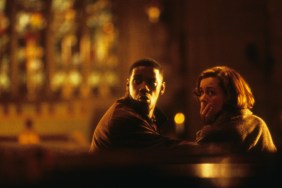
I’ve come to Sarah Polley‘s Stories We Tell after hearing about how great it is for over a year now. I had no idea what it was about and I feel it’s best not to know what it’s about before viewing it. That said, this review will spoil the revelations that sprout up throughout this documentary so if you wish to remain in the dark before seeing it for yourself you may not want to read any further.
Directing her first documentary after two narrative films, Polley sets about this latest feature as she sits down with members of her family, friends and others to explore the secrets of her family’s past. That, however, is a rather cold description of what is really a film filled with familial warmth. The facts of the matter are Sarah was born in January 1979 and for the better part of her life grew up believing Michael Polley was her biological father. As it turns out, her mother, Diane, had a brief affair with a man by the name of Harry Gulkin (who features prominently in this documentary). Sarah was the bundle of joy that came as a result of that affair.
Stories We Tell gets its title as a result of Sarah asking her siblings, friends, extended family and her two fathers to tell their version of the story, beginning with backstory on how Michael and Diane met, leading to Diane’s death as a result of cancer in 1990 and beyond. The duration of the documentary is narrated by her legal father, Michael, and mixed in with interview footage is archival family movies shot on Super 8 and recreations (also shot on Super 8) in which Polley directs actors, standing in for members of her family.
The archival and recreated footage work together seamlessly. Entirely intentional and working to the film’s benefit, I honestly didn’t know some of the footage was recreated until I watched the credits. I did, however, continually wonder throughout how in the hell she just so happened to capture some of the footage she did — such as Harry at her mother’s funeral or even some of the footage of Harry and Diane together during their affair. I believed every ounce of it, even though my first instinct was to question it.
Of course, these recreations get at the central theme of the film, and how stories are a product of the storyteller and how much “truth” we’re actually hearing when stories are told. The film plays as one long example of the old adage, “there are two sides to every story.” In this case there are more than two. In fact there are more than ten as it sets out to show how stories can take a life of their own, but I also felt there were other motivations behind the film and where I ultimately found a measure of discomfort while watching.
Beyond multiple points of views interpreting the same story, Stories We Tell feels like something I wasn’t meant to see. It’s an intimate window into the lives of people I don’t know and as we learn a little later, Harry Gulkin had actually written his version of the story down and planned on publishing it. We hear Polley questioning the need or reason for this private matter to be shared publicly only to later see every nook and cranny explored using her camera and the voices of those that lived it.
It almost seems like a personal project meant for private consumption that she ultimately decided to share with the world. When Sarah’s brother asks her what the film is about she responds, “A lot of things. Memory, how we tell the stories of our lives, how we bring someone back to life…” I guess, but if you ask me, I’d argue Sarah made this film as some sort of self-therapy and just so happened to find one of the only ways she could make sense of it all was to turn to what she knew best, filmmaking. Not so ironically, her legal father dealt with it in a similar way as we learn it reinvigorated his passion for writing as he too put the story to paper.
Considering her family is so open and honest, especially with one another, it seems so much of Stories We Tell comes together quite easily, it’s just a matter of editing everything down to figure out exactly what story will be told. Again, if I were to guess, I’d say what we’re seeing is Sarah sorting through the confusion and arriving at what she sees as the best understanding of the past and I would wager it comforts her. At least I hope it does, and not only her but her entire family, which appear to have taken the news of their mother’s infidelity with great stride and understanding.
For all these reasons I’m torn on what to think of the finished project. It felt like I was reading someone’s private diary, exposing personal details I wasn’t meant to know. At the same time, clearly everyone involved is fine with inviting the public into their private lives. Perhaps just as much as the film may have been therapeutic for Sarah, so it was for them all. Nevertheless, it still hit me with some measure of unease, perhaps because I choose to live much of my private life in private.
Polley’s filmmaking and storytelling are, nevertheless, impressive. Beyond what I may interpret to be her “real” motivations, her spoken interpretation of what the film is about and meant to accomplish is achieved and then some. It’s a powerful documentary for these reasons just as much as it is for how unique it is. While I would have preferred it to be about 30 minutes shorter (at least), the film’s ability to take a new approach to, and commentary on, storytelling does not go unnoticed.







